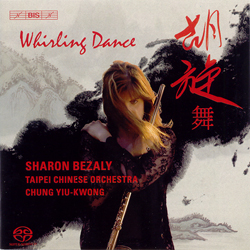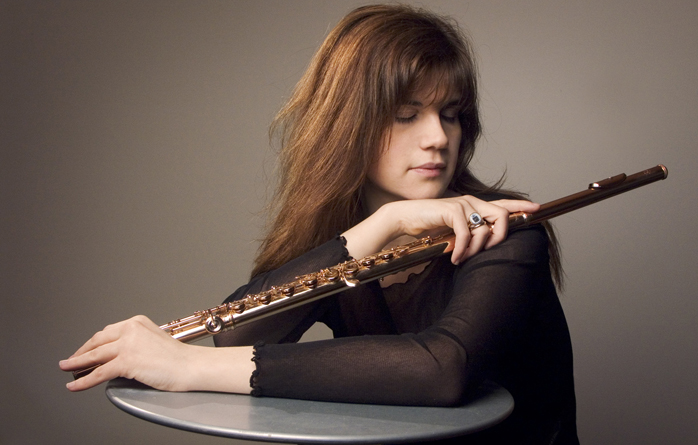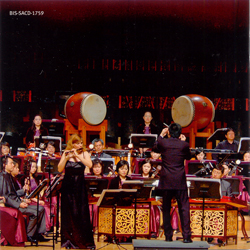 |
||||||||
 |
||||||||
 |
||||||||
Album Title: Whirling Dance - Works for Flute and Traditional Chinese Orchestra Performers: Sharon Bezaly, flute / Chung Yiu-Kwong, conductor / Taipei Chinese Orchestra Label and #: BIS SACD-1759 Running time: 65'13" Recorded: September 2008 What is common to Jean-Pierre Rampal, James Galway and Sharon Bezaly? They all play they flute and they all reached stardom, establishing the solo flute on the concert stage and gaining international acclaim. It's easy to assume that Bezaly gained success as a soloist at a much younger age by having the two prominent predecessors paving the way. To Bezaly's credit, after her prodigious debut at the age of 14 with the Israel Philharmonic conducted by Zubin Mehta, she worked hard by furthering her studies in Paris under the advice of Rampal and graduated with first prize in flute and chamber music. |
||||||||
 |
||||||||
Then like her predecessors, she enriched her experience as principal flautist in Camerata Academica Salzburg under Sándor Végh before embarking on her solo career in 1997. Since then she has played with leading orchestras in Europe, Asia and the Americas. Besides the standard repertoire, the Israeli-born artist is a keen advocate for music of our times. She inspired pre-eminent composers to write for her. The works dedicated to her are fast approaching twenty (seventeen at the last count), with seven of them being substantial concertos. The recordings she made with BIS have been showered with awards from around the world, including the Diapason and Gramophone. Audiophiles would be interested to know that Muramatsu, the world-renowned Japanese handcrafter's flute specialist since 1923, has tailor-made for Bezaly a 14-karat gold flute, a 24-karat gold flute and a silver/platinum-plated alto flute. |
||||||||
 |
||||||||
Bezaly is specially praised for her perfect control of circular breathing taught by Aurèle Nicolet, principle flautist of the Berlin Philharmonic and hired by Wilhelm Furtwängler. This liberates her from the limitations of the flute as a wind instrument to master it like the seamless bowing and tonal transparency of David Oistrakh. Once broken free from constraints of breathing, Bezaly's musicality took wings and soared. The title work "Whirling Dance" and the last movement of the "Flute Concerto" by Taiwanese composer-conductor Chung Yiu-Kwong (b. 1956) are literally breathtaking examples. The beauty is that Bezaly never draws your attention to her virtuosity but involves you with beguiling emotions through the melodic agility and exotic colours of these works. Written in 2007, Whirling Dance could be the flute version of Wieniawski's Scherzo-Tarantelle - with a Tadjik touch. The Flute Concerto of 2008 is dedicated to Bezaly. Despite traditional Chinese orchestra, the musical language is westernized, involving a lot of lively dialogue between soloist and symphonic forces. With the addition of harp and timpani, even the gehu and bass-gehu sound like celli and double-basses. The exotic middle movement requires some unorthodox multiphonics and flutter tongue flute techniques similar to flageolet and pizzicato on the violin. Bamboo Flute Concert by Ma Shui-Long (b. 1939) was composed in 1981. During their 1983 Asian tour, it was performed by the National Symphony Orchestra under the baton of Rostropovich in Taipei and broadcast live via satellite on the PBS network. The world premiere recording of the same year, with Chen Chung-Sen as soloist and Hsu Sung-Jen conducting the Yomiuri Nippon Symphony Orchestra [Taiwanese label Sunrise 8501], won the nation's best composition prize of the year. Professor Ma has been my favourite Chinese composers for many years. Like his other major compositions The Peacock flies Southeast and Liao Tian-ding Orchestral Suite, the Bamboo Flute Concerto is another brilliant example of the new Syncreticism that blends Chinese idioms with Western techniques without watering down to cliché. The work is in the conventional three-movement design, identified by Professor Ma's signature orchestral sound which is primal and rustic yet dramatic and grand. In audiophile terms, it's a perfect hifi feast. Instead of using the Chinese bamboo flute, Bezaly is as nimble as a butterfly on her Hammik wooden piccolo. The elegant middle movement is shrewdly devised with an intriguing cadenza that once again exemplifies her exquisite circular breathing. The immaculate sonic quality of the recording maintains a well-proportioned and three-dimensional soundstage that keeps the tiny piccolo and the gigantic cymbals and bass drums in balance. |
||||||||
 |
The remaining three works are transcriptions of well-known Chinese melodies. They are Autumn thoughts at the vanity table, a hundred-year old traditional pipa theme that has been popularized further by Cantonese operas; Fair flowers under full moon, an orchestral piece of the 60s; and Longing for the spring breeze, a Taiwanese popular song from the 1930s. Bezaly's sublime artistry blends naturally into the classical poetry. This disc redefines East-meets-West in the most meaningful way. |
|||||||
 |
||||||||
 |
||||||||